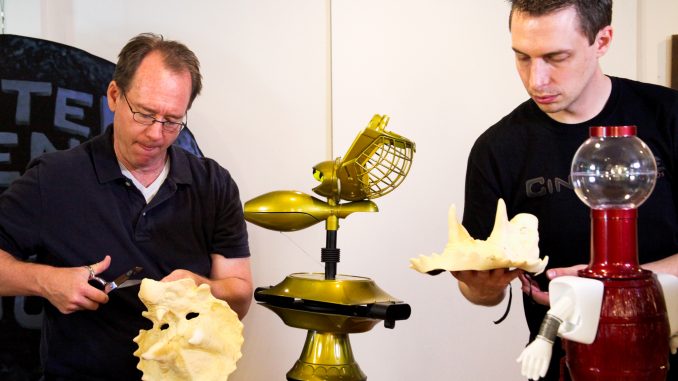
Matt Conant, a 2002 film and media arts alumnus, is the self-proclaimed founder of a “creative collaboration of nerds based in the Greater Philadelphia area.” Conant writes “smart comedy” for short and feature-length film projects.
Recently, Conant has been working with Jim Cotter, host and managing editor of WHYY-TV’s weekly arts magazine show “Articulate with Jim Cotter,” to produce a short-film sitcom entitled “Moot.” Each episode is between 2-4 minutes long, and they all take place in the fictional Huxta Middle School in suburban Pennsylvania.
Conant said the synopsis of the sitcom focuses on eight teachers trying “to navigate life, art and the educational system, while school guidelines, parental intervention and strikingly different personalities mean conflict at every turn.”
Conant said Cotter approached Cinevore Studios during Summer 2014 and asked the studio to create something to feature on his show.
Cotter said he features “Moot” on “Articulate with Jim Cotter” for two reasons – because the staff of Cinevore produces an entertaining, funny product, and because “Moot” attracts a different audience than the usual consumers of his show, which helps bring more people to the site.
“I asked [Cinevore Studios] to make a couple of pilots, and we put them on in the production studio,” Cotter said. “We sat around a computer monitor, and we actually laughed out loud. It was that simple. Funny is always good.”
Each episode of “Moot” focuses on a theme chosen by Cotter and is somehow relevant to the art world.
“Once [Cotter] gave us our first themes to work with, we decided a school was where the show belonged and we built the world, characters and story arcs from there,” Conant said. “We tried to build our world and our characters around the input we got from those in the teaching profession, and we try to portray all the characters as quirky and different, but overall, very likable people.”
“[Cotter] has given us a tremendous amount of creative freedom, and has been very specific about not wanting to micromanage us,” Conant added. “It’s amazing to have this amount of creative control, and to be working with a producer who gets it.”
Conant said he has been making films for fun since he was in 11th grade. Though Conant said he learned a lot from his film theory and history classes at Temple, he said the narrative film classes were undeveloped and “left a lot to be desired.”
“Overall, [the program] did inadvertently teach me one of the most important lessons about the film industry: if I wanted something done, I had to pretty much do it myself,” he said.
After that, Cinevore Studios was born. Launching the studio independently in 2003, Conant’s first project was a short film titled “Controls,” about a video game reviewer-turned-detective.
“Today, Cinevore is a narrative fiction company,” Conant said. “It’s almost always smart comedy, but with sci-fi, fantasy and gamer leanings. The goal of Cinevore is the same as it was back then – to tell entertaining stories and to do something a little smarter than most of what’s out there today.”
Conant said that Cinevore’s projects begin “in the writer’s brains,” and then reach the rest of the production team. Conant and his team are responsible for tasks like talking to clients, approving budgets, scheduling shoot days and revising scripts.
“One of the great parts of my job is there is no typical day,” Conant said. “Every day is different. Hearing people say, ‘I want to know what happens to those characters next,’ and knowing that our audience is emotionally invested in our projects is a feeling not everybody gets to experience in their lives.”
In the future, Conant hopes to expand Cinevore Studios and to one day receive enough funding to produce a feature-length film.
“We know it’s ambitious, but we honestly think it’s going to happen in the near future,” he said. “Who knows? Maybe the person reading this is the person who can help that happen.”
Michaela Winberg can be reached at michaela.winberg@temple.edu.



Be the first to comment